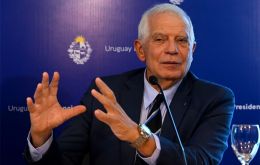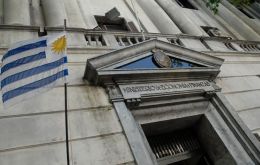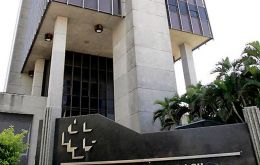MercoPress. South Atlantic News Agency
Economy
-
Monday, October 24th 2022 - 19:14 UTC
Josep Borrell meets with Uruguayan President in Montevideo

Uruguayan President Luis Lacalle Pou, who holds the pro-tempore presidency of Mercosur, Monday welcomed European Union (EU) High Representative Josep Borrell in Montevideo to discuss the future of the agreement between the two trade blocs.
-
Monday, October 24th 2022 - 09:30 UTC
Moody's: Major devaluation of Mexican peso forecast

According to the credit rating agency Moody's, a devaluation of around 20% of the Mexican peso against the US dollar would be imminent and might take place later this year or in early 2023, it was reported.
-
Saturday, October 22nd 2022 - 10:20 UTC
Gloomy picture of UK economy: Sterling KO, retail sales down and government borrowing increasing

Pound sterling trading ended on Friday at US$ 1.12, after rallying on Thursday following the announcement of Prime Minister Liz Truss Thursday resignation. However new figures showed a gloomy picture of the UK economy.
-
Saturday, October 22nd 2022 - 10:00 UTC
Japanese rating agency ups Uruguay's grading

Japanese risk rating agency R&I raised Uruguay's status from BBB to BBB+, the best grading the South American country has ever received, it was announced Friday.
-
Friday, October 21st 2022 - 20:47 UTC
Costa Rica on brink of joining Pacific Alliance

Costa Rica may soon be joining the Pacific Alliance after the organization's Council of Ministers Thursday approved the Central American country's request to begin negotiations to join the regional bloc, it was reported.
-
Thursday, October 20th 2022 - 09:47 UTC
Milei plans to “dollarize” economy if elected President of Argentina

Argentine Libertarian Congressman Javier Milei told US Ambassador Marc Stanley he would “dollarize” Argentina if he is elected president in 2023 during a meeting Wednesday at the Embassy in Buenos Aires.
-
Wednesday, October 19th 2022 - 10:45 UTC
Lacalle Pou: Argentina's protectionist measures detrimental to Uruguay

Uruguayan President Luis Lacalle Pou criticized Argentina's recent economic measures saying they “do not go with the spirit of Mercosur.”
-
Tuesday, October 18th 2022 - 19:11 UTC
Argentine delegations tour Brazil seeking business opportunities

Argentina's Ambassador to Brazil Daniel Scioli Monday headed a trade mission in the Brazilian city of Porto Alegre searching for business opportunities at the Federation of Industries of the State of Rio Grande do Sul (FIERGS) which brings together 114 industrial unions and over more than 47,000 industries.
-
Tuesday, October 18th 2022 - 10:09 UTC
Arbeleche says Uruguay going through economic recovery

Uruguay's Economy Minister Azucena Arbeleche Monday underlined her country was going through a process of economic recovery despite the global scenario.
-
Tuesday, October 18th 2022 - 10:07 UTC
Inflation projections in Brazil fall yet again

Brazilian economic authorities have cut down projections regarding 2022's annual inflation from 5.71% to 5.62%, it was reported Monday. It was the 16th consecutive reduction of the National Wide Consumer Price Index (IPCA) estimate.
